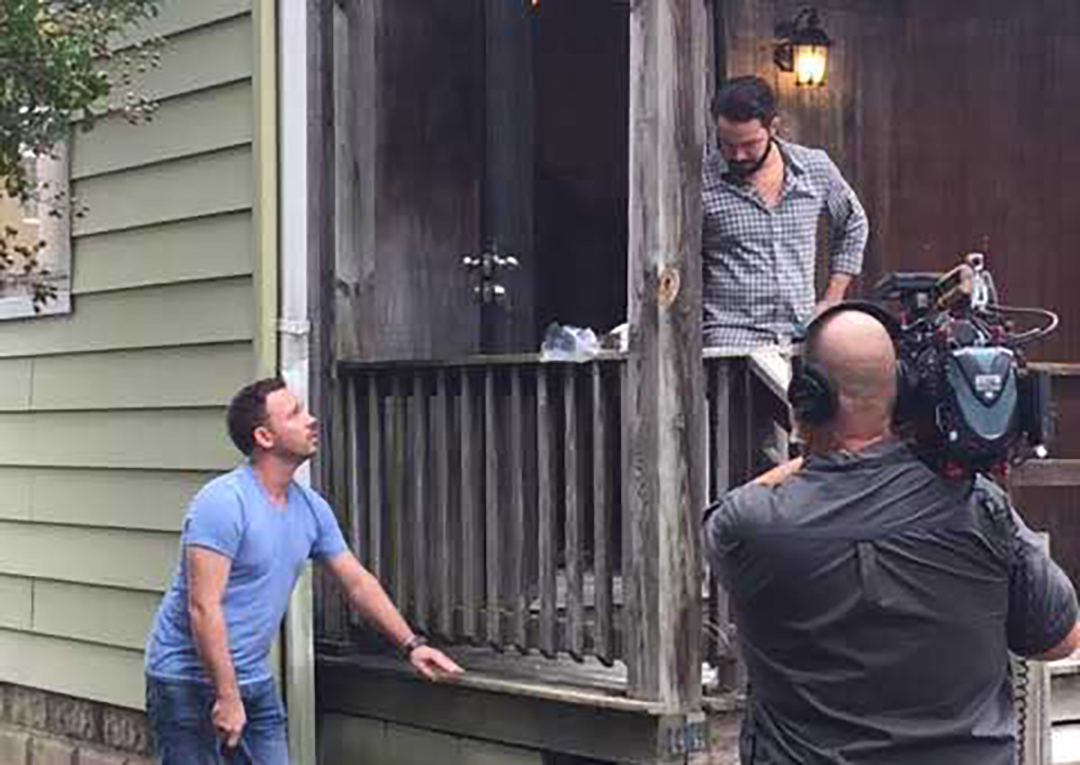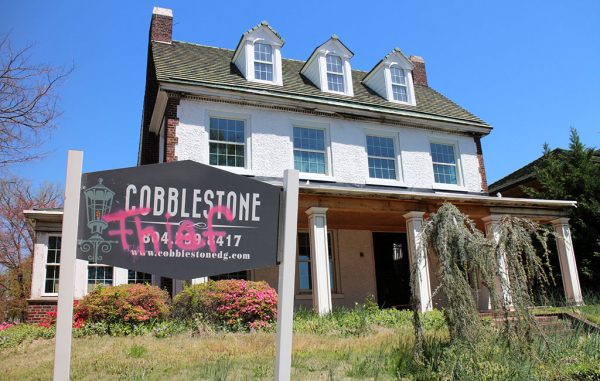
Josh Romano, top right, during filming of the HGTV “Richmond Rehabbers” pilot in 2017. (BizSense file photos)
A judge’s ruling in favor of Josh Romano in a dispute with one of his former lenders is signaling an end to the nearly three-year bankruptcy of the once-high-profile local house-flipper.
In an order filed late last month, U.S. Bankruptcy Judge Kevin Huennekens dismissed a lawsuit against Romano from Tuckahoe Funding LLC, a so-called hard money lender that alleged Romano committed fraud and embezzlement that led to funds for certain home renovation projects being misappropriated.
Huennekens sided with Romano in placing blame for the missing funds on S. Page Allen & Associates, the local real estate law firm that was responsible for disbursing construction draws to Romano’s Cobblestone Development Group. The funds were loaned by Tuckahoe Funding, an entity owned by William Everette Starke Jr.
Huennekens also pointed to Romano reporting the missing funds to Starke — as well as to the Federal Bureau of Investigations — as an indicator that Romano did not set out to deceive Starke.
“No party who is in that position would go and lay all of their books and records before the FBI and say, ‘Please go through everything and look at this.’ It just strains credibility,” Huennekens said in his ruling that closed a one-day trial held in July, a recording of which was obtained by BizSense.
“The reliance was placed on the escrow agent, and it was placed there by both parties. That’s where the court finds that this entire system broke down,” Huennekens said, referring to S. Page Allen & Associates. “…If blame is to be cast, that is obviously the first place it should be put, because the escrow agent, whether it was a breach of contract or something else, did not do their job.”
Later, reiterating an opening statement from Romano’s attorney, the judge added: “I do think we have two victims here, and the wrong person that we’re pursuing.”
The ruling dismisses the lawsuit with prejudice, meaning Starke cannot file the complaint again. Huennekens said Starke does have a right to appeal the decision, though his attorney, Bill Bayliss of Williams Mullen, said last week he was unsure if an appeal would be pursued.
In his argument at trial, Bayliss maintained that Romano’s representations to Starke ended up costing his client over $2 million.
“This man is not a victim. He’s a perpetrator of a fraudulent scheme,” Bayliss said of Romano during the trial, arguing that Romano knowingly used funds meant for certain jobs on other projects or expenses.
“He shouldn’t be rewarded for his artistry and being able to fool everybody and getting everybody to trust him, and then taking this money and using it as he shouldn’t have used it and leaving my clients high and dry, with a bunch of unimproved property that they had to go borrow money on and pay for it that’s cost (Starke) over $2 million,” Bayliss said.
Bankruptcy case concluding
The suit’s dismissal effectively wraps up Romano’s Chapter 7 bankruptcy case, which has been ongoing since Romano petitioned for it in late 2018.
Peter Barrett, a Kutak Rock attorney assigned as trustee in the case after the withdrawal of original trustee Bruce Matson, said the case was over when asked about it last week.
Last November, three months after Starke’s suit was filed, Barrett filed a trustee’s report asking to be discharged from the bankruptcy case because there were no funds in Romano’s estate to be distributed to creditors.
In his 2018 filing, Romano listed nearly $770,000 in liabilities owed to 75 creditors, against $7,300 in assets. Court filings show he changed his home address three times over the course of the case. Property records indicate his latest listed address is a house owned by family members.
Starke’s suit sought to collect at least $750,000 in alleged damages and prevent those funds from being discharged as part of the bankruptcy case. While Huennekens’ ruling allowed that debt to be discharged to Romano’s bankruptcy estate, that doesn’t mean such funds exist, according to attorneys involved in the case who discussed it on background.
Starke’s case was the last in a string of lawsuits Romano had faced since winding down his Cobblestone brand amid mounting debt and disputes with former clients.
At one point renovating and selling nearly 30 homes in a year, the fast-growing firm hit a high point in 2017 when it was featured in an HGTV pilot called “Richmond Rehabbers,” which ultimately was not picked up for a series.

A vandalized Cobblestone sign in 2018 stands in front of one of several Romano properties that were deeded back to lenders.
‘What we have here is a terrible travesty’
In Starke’s case, his LLC mitigated some of its alleged damages by reaching a settlement with S. Page Allen & Associates, according to court records. Romano’s response to the suit stated that Starke terminated its relationship with the firm and sued it for malpractice before settling the case.
Romano argued that it was he who brought the missing funds to Starke’s attention after becoming suspicious of the law firm’s accounting when he requested draws and was told there were no funds available. After having his own accountants investigate the matter, Romano’s response said it was discovered that the firm was not holding as much funds as its records reflected and was miscalculating interest rates on the funds, among other alleged discrepancies.
In his remarks, Huennekens described the Allen firm’s loan documents as “terribly deficient from a lender’s perspective,” and called accountings that the firm created after the fact “woefully deficient.”
“The loan documents that we do have were not adhered to,” Huennekens said. “The timeframes for commencement and completion of work (were) not enforced; there was never any call on any of the notes. All of the matters were handled somewhat informally.
“I think what we have here is just a terrible travesty,” he said. “There’s no doubt that there’s been a lot of money that has been lost in this case.”
BizSense reached out to firm principal Page Allen for comment for this story. Messages left this week with her office and an email to Allen were not returned.
Reached last week, Romano deferred comment for this story to John Bedi, a Chesapeake attorney who represented him against Starke.
Bedi said Romano also lost money in the scenario and could consider legal action against Allen’s firm. Should Huennekens grant Barrett’s request to be discharged as trustee and officially close the bankruptcy case, that would give Romano an opening to do so, Bedi said.
“I can speculate that is something that Josh would be very interested in looking into, based on the way he felt like he was treated by everyone involved,” Bedi said.
As for any FBI involvement in the matter, it’s unclear whether the bureau continues to look into Romano’s claims, as it traditionally does not confirm active investigations. Bedi said investigations of some sort could be underway or forthcoming.
“I feel fairly certain, based on all the evidence that was presented, that at least one or two agencies will be looking into this,” Bedi said.

Josh Romano, top right, during filming of the HGTV “Richmond Rehabbers” pilot in 2017. (BizSense file photos)
A judge’s ruling in favor of Josh Romano in a dispute with one of his former lenders is signaling an end to the nearly three-year bankruptcy of the once-high-profile local house-flipper.
In an order filed late last month, U.S. Bankruptcy Judge Kevin Huennekens dismissed a lawsuit against Romano from Tuckahoe Funding LLC, a so-called hard money lender that alleged Romano committed fraud and embezzlement that led to funds for certain home renovation projects being misappropriated.
Huennekens sided with Romano in placing blame for the missing funds on S. Page Allen & Associates, the local real estate law firm that was responsible for disbursing construction draws to Romano’s Cobblestone Development Group. The funds were loaned by Tuckahoe Funding, an entity owned by William Everette Starke Jr.
Huennekens also pointed to Romano reporting the missing funds to Starke — as well as to the Federal Bureau of Investigations — as an indicator that Romano did not set out to deceive Starke.
“No party who is in that position would go and lay all of their books and records before the FBI and say, ‘Please go through everything and look at this.’ It just strains credibility,” Huennekens said in his ruling that closed a one-day trial held in July, a recording of which was obtained by BizSense.
“The reliance was placed on the escrow agent, and it was placed there by both parties. That’s where the court finds that this entire system broke down,” Huennekens said, referring to S. Page Allen & Associates. “…If blame is to be cast, that is obviously the first place it should be put, because the escrow agent, whether it was a breach of contract or something else, did not do their job.”
Later, reiterating an opening statement from Romano’s attorney, the judge added: “I do think we have two victims here, and the wrong person that we’re pursuing.”
The ruling dismisses the lawsuit with prejudice, meaning Starke cannot file the complaint again. Huennekens said Starke does have a right to appeal the decision, though his attorney, Bill Bayliss of Williams Mullen, said last week he was unsure if an appeal would be pursued.
In his argument at trial, Bayliss maintained that Romano’s representations to Starke ended up costing his client over $2 million.
“This man is not a victim. He’s a perpetrator of a fraudulent scheme,” Bayliss said of Romano during the trial, arguing that Romano knowingly used funds meant for certain jobs on other projects or expenses.
“He shouldn’t be rewarded for his artistry and being able to fool everybody and getting everybody to trust him, and then taking this money and using it as he shouldn’t have used it and leaving my clients high and dry, with a bunch of unimproved property that they had to go borrow money on and pay for it that’s cost (Starke) over $2 million,” Bayliss said.
Bankruptcy case concluding
The suit’s dismissal effectively wraps up Romano’s Chapter 7 bankruptcy case, which has been ongoing since Romano petitioned for it in late 2018.
Peter Barrett, a Kutak Rock attorney assigned as trustee in the case after the withdrawal of original trustee Bruce Matson, said the case was over when asked about it last week.
Last November, three months after Starke’s suit was filed, Barrett filed a trustee’s report asking to be discharged from the bankruptcy case because there were no funds in Romano’s estate to be distributed to creditors.
In his 2018 filing, Romano listed nearly $770,000 in liabilities owed to 75 creditors, against $7,300 in assets. Court filings show he changed his home address three times over the course of the case. Property records indicate his latest listed address is a house owned by family members.
Starke’s suit sought to collect at least $750,000 in alleged damages and prevent those funds from being discharged as part of the bankruptcy case. While Huennekens’ ruling allowed that debt to be discharged to Romano’s bankruptcy estate, that doesn’t mean such funds exist, according to attorneys involved in the case who discussed it on background.
Starke’s case was the last in a string of lawsuits Romano had faced since winding down his Cobblestone brand amid mounting debt and disputes with former clients.
At one point renovating and selling nearly 30 homes in a year, the fast-growing firm hit a high point in 2017 when it was featured in an HGTV pilot called “Richmond Rehabbers,” which ultimately was not picked up for a series.

A vandalized Cobblestone sign in 2018 stands in front of one of several Romano properties that were deeded back to lenders.
‘What we have here is a terrible travesty’
In Starke’s case, his LLC mitigated some of its alleged damages by reaching a settlement with S. Page Allen & Associates, according to court records. Romano’s response to the suit stated that Starke terminated its relationship with the firm and sued it for malpractice before settling the case.
Romano argued that it was he who brought the missing funds to Starke’s attention after becoming suspicious of the law firm’s accounting when he requested draws and was told there were no funds available. After having his own accountants investigate the matter, Romano’s response said it was discovered that the firm was not holding as much funds as its records reflected and was miscalculating interest rates on the funds, among other alleged discrepancies.
In his remarks, Huennekens described the Allen firm’s loan documents as “terribly deficient from a lender’s perspective,” and called accountings that the firm created after the fact “woefully deficient.”
“The loan documents that we do have were not adhered to,” Huennekens said. “The timeframes for commencement and completion of work (were) not enforced; there was never any call on any of the notes. All of the matters were handled somewhat informally.
“I think what we have here is just a terrible travesty,” he said. “There’s no doubt that there’s been a lot of money that has been lost in this case.”
BizSense reached out to firm principal Page Allen for comment for this story. Messages left this week with her office and an email to Allen were not returned.
Reached last week, Romano deferred comment for this story to John Bedi, a Chesapeake attorney who represented him against Starke.
Bedi said Romano also lost money in the scenario and could consider legal action against Allen’s firm. Should Huennekens grant Barrett’s request to be discharged as trustee and officially close the bankruptcy case, that would give Romano an opening to do so, Bedi said.
“I can speculate that is something that Josh would be very interested in looking into, based on the way he felt like he was treated by everyone involved,” Bedi said.
As for any FBI involvement in the matter, it’s unclear whether the bureau continues to look into Romano’s claims, as it traditionally does not confirm active investigations. Bedi said investigations of some sort could be underway or forthcoming.
“I feel fairly certain, based on all the evidence that was presented, that at least one or two agencies will be looking into this,” Bedi said.




I’m going to go out on a limb here and pure speculation…. The escrow attorney, with the 16 year old website and the office address of the mattress factory and auto parts store had to have been fully involved with Romano, they had to have known exactly what each were doing. No way Romano just finds this person in the yellow pages and says they look like the best in the business. And then this attorney scams Romano totally out of the blue. My bet is they were fully complicit in their dealings and Page is simply taking the fall.… Read more »
Construction files are not your average “escrow file”, and to compound the complexity, if the Lender is not on their game and or the attorney is not on their A game, it is easy to foul up the process. That being said, what probably happened was that money was transferred between files and that is a recipe for disaster. It shouldn’t be that hard to piece the files back together – it is only Debits and Credits
As we all shake our heads in disbelief, Romano skates through with a golden horseshoe. Bankruptcy courts are set up to give someone a second chance, that’s all he is getting. He’s harping on a victory knowing that he fully deceived people. Keep cheering, I’ll be over here eating popcorn waiting for the next Bizsense story where they throw him in jail because the other investigations actually found fraud.
Today is that day lol
What I find extraordinary about BizSense is their lack of bias in reporting. This is a man who did swindle money from innocent people and then declare bankruptcy. Meanwhile, touting to friends, “If you you quit ONCE it becomes a habit. Never quit!!!” I expect more GREAT things to come out of Mr. Romano and I hope Richmond BizSense reports them with the same zeal. He beat the bankruptcy court, not court of public opinion of those who know what he did to them and their homes. Be careful how you keep fist pumping.
This sure didn’t age well given todays news that he’s facing a federal indictment for fraud.
It’s sad to see this post when you are one of those that Romano didn’t pay and just declare bankruptcy and left, leaving us with unpaid salaries with our employees
As a current homeowner of a house renovated by Josh Romano, I can attest to his terrible work. His shoddy electrical patchwork and quick cover-ups of structural problems are dangerous crimes in and of themselves.